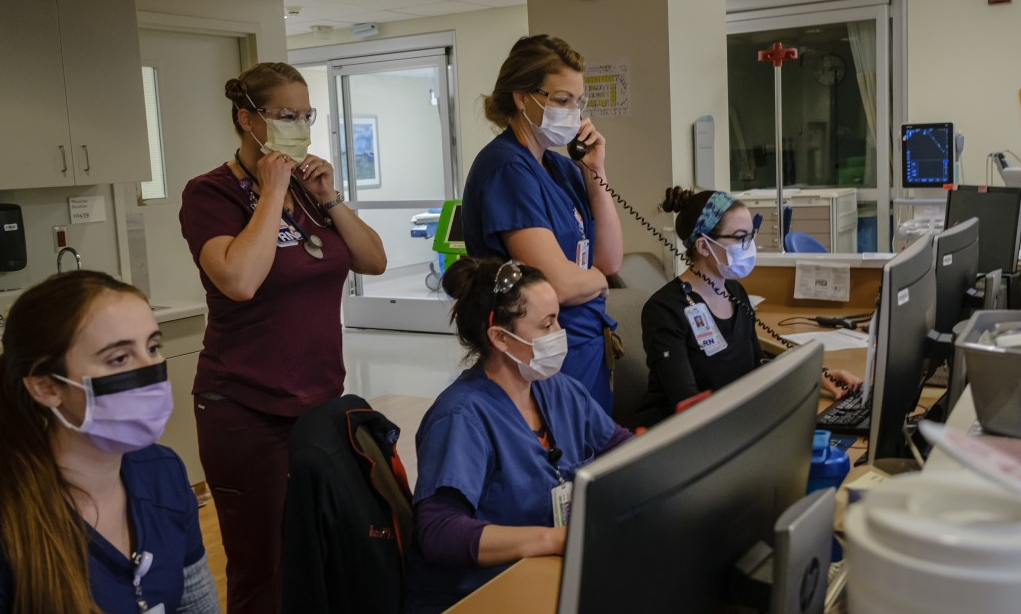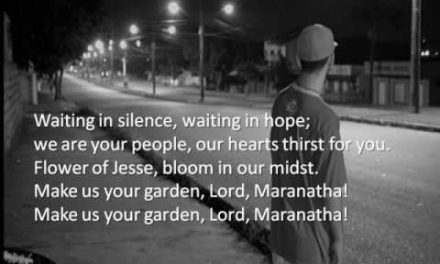This is a guest post by Dr. Julie Hanlon Rubio, Professor of Social Ethics at the Jesuit School of Theology, Berkeley/Santa Clara University. Our first (introductory) post in this series is here; the second (on racism) is here; the third (on social sin and conscience formation) is here; and the fourth (on climate change) is here. We invite to you check back often between now and November 3 for more conversation in this Conscience in the Polls series @CMT.

This spring when Covid-19 led many states to issue shelter in place orders, work and family were turned upside down, and the deep inequities in our system were brought into stark relief. Some lost their jobs, and their healthcare. Others entered the chaos of working from home while often also caring for and homeschooling children. Essential workers kept their jobs, but faced an increased risk of contracting the virus and taking it home. Workers who felt sick were told to not to come to work, but feared losing their income and their jobs. The unemployment rate rose from a historic low of 3.5% to 14.7%, and is now 10.2%. Many worry that job cuts or furloughs are imminent and have had to make difficult decisions about whether or not to send children back to school. Women, especially, have paid a price at work and at home. Food insecurity is at record highs and though there is a moratorium on evictions, households that have lost income must eventually pay the rent they owe. People of color are suffering more than whites on every count.
The global pandemic has not only taken the lives of 186,000 Americans, it has exposed our failure to place people at the center of the economy, as Pope Francis has called us to do. What would justice for workers and their families look like? With the presidential election just two months away, it is important for Catholics to ask where candidates and their parties stand.
For Catholics, the primary framework for assessing the policies and priorities of candidates is Catholic Social Teaching. CST has from its beginnings prioritized “the dignity of work and the rights of workers.” It calls for a just wage (one that allows a worker’s family to have the basic necessities of life), identifies rights of workers (including rights to work, benefits, rest, and safe working conditions). Workers also have a right to form unions and advocate for their interests. Labor priests of the early 20th century organized workers and contributed to the passage of policies that improved the situation of workers, like the minimum wage and the eight-hour work day.
Behind this history of Catholic labor advocacy lies an understanding of the worker as a person with a transcendent end or telos and a family. Work, St. John Paul II memorably said is for “man” (today we would say “humans”), not the other way around. Employers have a responsibility to ensure that “mothers” (or “parents”) can work and care for their families. Government has a responsibility to come in as an “indirect employer” to make up for what employers are unable to provide so that all persons can flourish. Work and family are profoundly interconnected and government has a crucial role in ensuring that the common good (the conditions that enable everyone to flourish) is achieved. Because of these convictions, CST has long promoted “the priority of labor” and the family.
Things to consider when thinking about workers and families include: the availability of good jobs, just wages, health care benefits, sick leave, family leave, security for retirement, and a favorable environment for unions. One also might think about policies affecting domestic workers, farm workers, and workers in the gig economy; the availability of affordable child care; and policies on migration and incarceration. All impact work and family.
The Republican Party platform for 2020 emphasizes creating jobs and building prosperity by lowering taxes, freeing markets from regulation, and freeing communities from government over-reach. At last month’s convention, the now famous McCloskeys, who hail from my hometown of St. Louis,MO, suggested that Democrats want to abolish the suburbs, echoing a consistent convention theme that Republicans would protect families. The party platform lays out the party’s strategy of freeing families and communities from government:
We are the party of independent individuals and the institutions they create together—families, schools, congregations, neighborhoods-to advance their ideas and make real their dreams. Those institutions, standing between the citizens and the power of government, are the pillars of a free society. They allow Americans to work together to solve most of the problems facing their communities. They thus reduce the need for intervention by government in the for of more and bigger programs …
Evaluating the platform in light of CST, one finds few references to worker’s rights, just wages, benefits, or unions. The party’s strategy might be said to reflect a commitment what CST calls “subsidiarity” which values smaller associations. However, subsidiarity is, as Meghan Clark so aptly put it many years ago on this blog, “a two sided coin”—meaning “decisions should be made at the lowest level possible and the highest level necessary.” The low unemployment rate before the pandemic began is a plus, but jobs alone are not enough for families to thrive. More middle class workers find it difficult to provide for their families, the value of the minimum wage is 30% less now than in 1968, only 15% of workers have access to paid family leave, and rising health care costs are consuming modest income gains and destabilizing family life. Advocates of deregulation make big promises, but in recent decades, “high economic inequality has concentrated economic resources among those at the very top of the U.S. income and wealth ladders while leading to fewer and fewer protections for the economic security of workers and their families.”
The Democratic party platform promises to restructure an economy “rigged against working families and the middle class” with investments and protections for workers. Seeing the burdens Americans are carrying, especially now, they offer a plan for a caregiving economy which makes child care and elder care make accessible and affordable. Democrats commit to:
a new social and economic contract with the American people …a contract that invests in the people and promotes shared prosperity, not one that benefits only big corporations and the wealthiest few. One that affirms housing is a right and not a privilege, and which makes a commitment that no one will be homeless or hungry in the richest country on earth. A new economic contrast that raises wages and restores workers’ rights to organize, join a union, and collectively bargain. One that at last supports working families and the middle class by securing equal pay for women and paid family leave for all.
In light of CST, this plan centers the rights of workers and the needs of families. It recognizes, as did St. John Paul II in the Charter of the Rights of the Family, that families have a right to social and economic conditions that allow them to flourish. Acknowledging the suffering of ordinary people, the party is ready to ask to government to do more, not less. One might argue that the government programs are inherently inefficient and, no matter how well-intentioned, doomed to make families’ lives worse or that CST recognizes the potential problems of the large modern nation state. However, even in Centesimus Annus, the CST document most favorable to market economies, stresses the responsibilities of governments both to promote a strong economy and to protect workers and support families (CA #15, 40, 42). While a Catholic may certainly judge specific government initiatives to be problematic, the basic duties of government with regard to workers and families can’t be denied.
As earlier posts in this series have noted, no one party aligns perfectly with CST, voting requires prudential discernment, and there are no easy or obvious answers. Catholics may legitimately support the Democratic or Republican parties, favor the Green New Deal or the Lincoln Project on the edges of those parties, choose the American Solidarity Party, identify as Independent, or decide not to vote at all. Our common ground lies in a shared commitment to CST which stresses the interconnection of all humans and obliges us to ask not “Am I better off?” but “How can my vote best contribute to the common good?”
-Julie Hanlon Rubio


